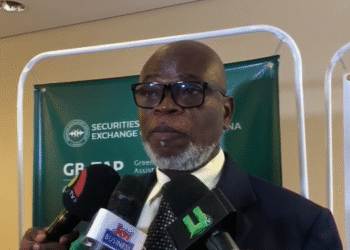Interest rates in Ghana’s money market are anticipated to stabilize in the upcoming treasury bills auction on Friday, January 24, 2025.
This projection comes in the face of heightened government demand for short-term instruments to refinance maturing bills. Despite the recent upward trajectory in interest rates, market activity has remained robust, underpinned by investors’ appetite for high yields.
Since the start of 2025, interest rates on treasury bills have been steadily climbing, creating a challenging borrowing environment. Currently, rates are averaging around 29%, reflecting the heightened risk premium associated with short-term government debt. The uptick in yields has been driven by several factors, including fiscal pressures and strong market demand.
To meet its financing needs, the government plans to raise GH¢6 billion through the issuance of 91-day, 182-day, and 364-day treasury bills. The funds will be primarily used to refinance maturing bills worth GH¢5.60 billion. This move is critical for sustaining liquidity in the short-term debt market and managing the rollover of existing obligations.
Investor interest in treasury bills has been robust in recent weeks, fueled by the high-yield environment. Despite market speculation of a hold in monetary policy rates, the attractive returns offered by T-bills have continued to draw investors.
Analysts attribute this trend to significant upcoming maturities, which have heightened demand from both individual and institutional investors. The need for the government to roll over maturing bills further amplifies this demand, creating a dynamic where supply and demand interact to stabilize rates.
Oversubscription Trend
Last week, the government experienced its third consecutive oversubscription in the treasury bills market, signaling continued confidence among investors. Against a target of GH¢6.35 billion, the government accepted a total of GH¢8.84 billion, exceeding its funding goals by a substantial margin.
The oversubscription was achieved despite GH¢5.53 billion in maturing bills, showcasing the high liquidity in the market and strong investor participation. However, marginal rejections were noted for 91-day and 182-day instruments, suggesting selective acceptance based on rate considerations.
The yields on treasury bills have shown a consistent upward trend. For the 91-day, 182-day, and 364-day bills, yields settled at 28.42% (+8 basis points), 28.96% (+1 basis point), and 30.29% (+11 basis points), respectively, on a week-on-week basis. The increase reflects the growing cost of borrowing for the government, even as it benefits from the strong market appetite.
The expected stabilization of interest rates in the upcoming auction is a welcome development for the market. With rates already elevated, further increases could deter participation or escalate the government’s borrowing costs. Analysts suggest that the anticipated hold in monetary policy rates this week could contribute to this stabilization, as it signals a more predictable interest rate environment.
However, the underlying fiscal pressures and the government’s borrowing needs remain significant factors influencing market dynamics. While the stabilization of rates may offer some relief, sustained fiscal discipline and strategic debt management are crucial for long-term stability.
The government’s ability to secure funds to refinance maturing bills while maintaining investor confidence will be critical in the weeks ahead. The oversubscription trend indicates robust demand, but the rising yields highlight the cost of maintaining this momentum.
The upcoming GH¢6 billion auction will test the market’s appetite further. With substantial maturities to settle, the Treasury must strike a balance between securing funds and managing the upward pressure on rates.
READ ALSO: Ghana Ranks First in Global Mobile Money Regulation























